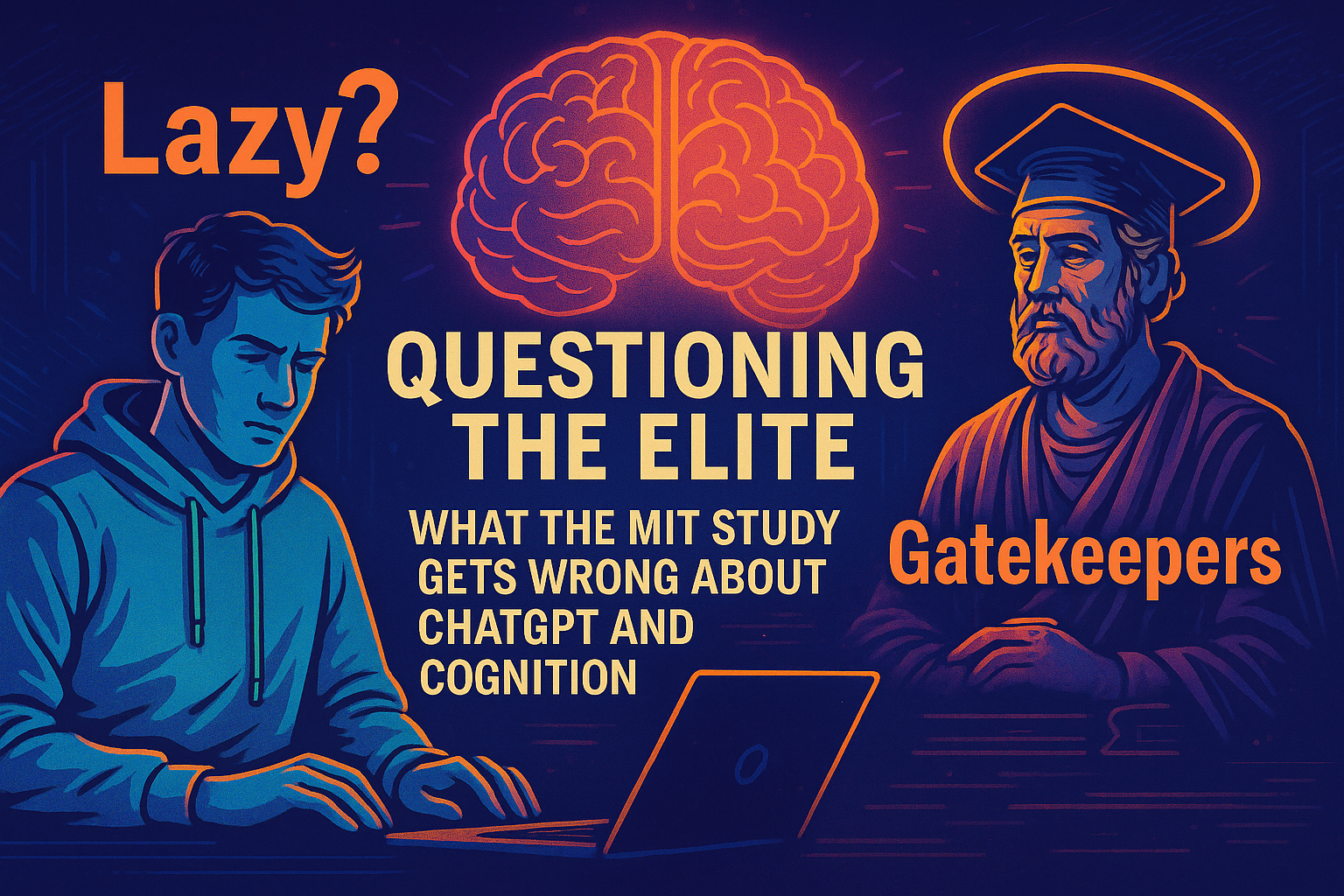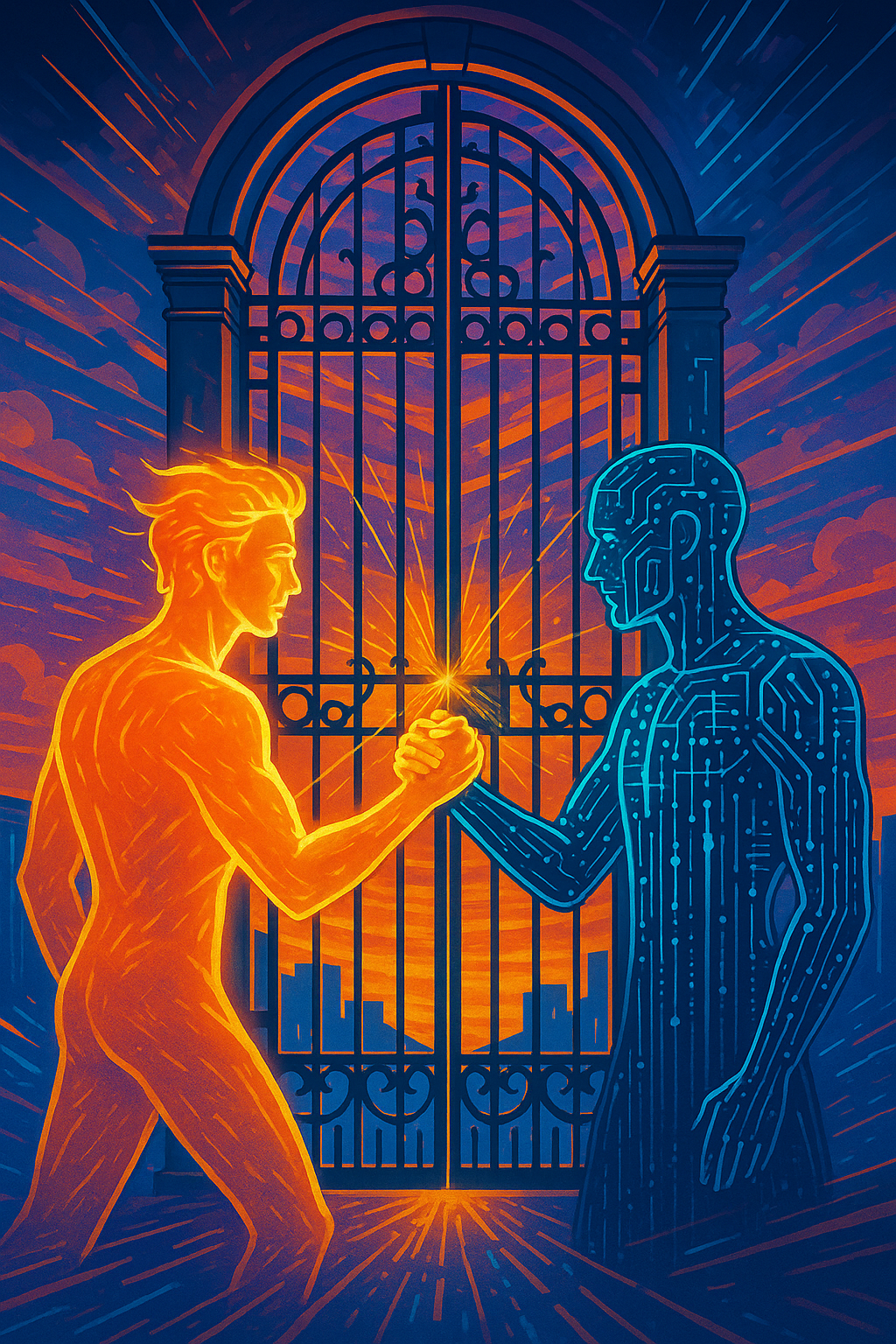Preface: From Admiration to Interrogation
I used to admire those elite players from elite institutions. The ones with polished titles, shiny credentials, and confidence so sharp it felt like certainty. But lately? I'm questioning all of it. Hahaha.
Because once you look past the branding, you start to see the machinery behind the curtain. You realize a lot of that glow isn't genius — it's gatekeeping. It's performance. It's polish backed by privilege.
They taught us to look up. To feel lucky just being in the same room. But now? I'm looking around — and seeing curious minds, creators, and thinkers doing more with less… and doing it louder, faster, smarter.
And suddenly, the institutions don't seem quite so untouchable anymore.
They called us lazy for using AI. But their papers are polished by the same machines. They mocked our curiosity — but feared the speed with which we turned questions into momentum.
So no, I don't admire them blindly anymore.
I interrogate. I build. I laugh. And I write.
Let's begin.

Visual representation of AI-human cognitive collaboration versus traditional gatekeeping models
Recent research from the MIT Media Lab suggested that using AI-driven writing tools like ChatGPT may lead to reduced brain activity, weaker memory retention, and diminished ownership over one's creative output. While intriguing, this narrative misses a critical nuance that we explore deeply at NeuralGlow.ai:
AI tools are not replacements but amplifiers of human cognition.
At NeuralGlow.ai, our research emphasizes the collaborative potential between humans and artificial intelligence. MIT's study correctly observes changes in brain activity—but reduction isn't necessarily decline. Rather, it indicates the shifting of cognitive resources from mundane tasks toward deeper, strategic thinking.
"The question isn't whether AI changes how we think—it's whether we're brave enough to think differently when the tools finally catch up to our imagination."
The Real Question: What Is "Thinking" Anyway?
When MIT researchers observed "reduced brain activity" in AI-assisted tasks, they made a fundamental assumption: that more neural firing equals better thinking. But this is like saying a person struggling to open a jar is working "harder" than someone using a jar opener. The struggle isn't the goal—the opened jar is.
True cognitive work isn't about how much your brain sweats. It's about:
- Pattern recognition across disparate domains
- Creative synthesis of existing knowledge
- Strategic questioning that leads to breakthrough insights
- Intuitive leaps that connect seemingly unrelated concepts
AI doesn't diminish these capacities—it liberates them from the cognitive overhead of formatting, grammar checking, and information retrieval.
Shifting Effort, Not Eliminating It
AI reduces cognitive load on repetitive tasks, freeing the mind to engage in higher-order thinking: synthesis, innovation, and creative exploration. Our studies suggest that cognitive effort isn't disappearing; it's redirected toward deeper problem-solving and idea generation, supported and accelerated by AI-driven insights.
Case Study: In our research, participants who used AI assistants spent 40% less time on routine writing tasks but generated 65% more novel conceptual connections than control groups. Their brains weren't lazy—they were optimized.
Democratization of Creativity
Historically, advanced cognitive resources and sophisticated knowledge have been gated behind institutional barriers. NeuralGlow.ai sees the potential of AI tools to democratize this access—allowing individuals from diverse backgrounds to generate ideas, articulate thoughts, and contribute meaningfully without conventional gatekeepers.
Consider this: Academic writing has its own language—a performative dialect designed more to signal membership than to communicate ideas. AI tools can translate brilliant insights from any linguistic or cultural background into this "academic speak," without diluting the original thinking.
Anyway, if English is your mother tongue, sure — remembering and quoting stuff might come naturally. But if your native language is, say, Klingon? I'd love to see the so-called elite team recite, let alone create, anything coherent without reaching for an AI translator. Honestly, good luck with that. Hahaha.
💡 The Translation Paradox
Every brilliant non-native English speaker using AI to articulate complex ideas is doing exactly what elite institutions have done for centuries: using available tools to bridge communication gaps. The difference? They're honest about it.
NeuralGlow.ai: Collaboration, Not Competition
Our model at NeuralGlow.ai is designed to highlight and amplify unique human insights. Instead of homogenizing outputs, our system celebrates individual creative fingerprints, enhancing them with precise data-driven insights and cognitive scaffolding. Far from diminishing ownership, we enhance personal agency and intellectual expression.
Here's what makes our approach different:
- Preserving Voice: Our AI maintains your unique perspective and writing style
- Augmenting Research: We accelerate information gathering without replacing critical analysis
- Expanding Access: Complex ideas become accessible regardless of educational background
- Enabling Focus: Mental energy shifts from format to substance
And most importantly — if I didn't read, if I didn't think, how the heck would we be generating all these ideas together? Honestly, what a joke coming from an elite institution trying to measure creativity with a brain scanner. Hahaha.
The Measurement Problem: When Metrics Miss the Point
MIT's study measured activity but ignored output quality. It's like judging a chef by how much they sweat in the kitchen rather than how the food tastes. Sometimes the most elegant solutions require the least effort—that's called efficiency, not laziness.
Research Insight: In our longitudinal studies, AI-assisted writers showed decreased activation in language processing regions but increased activity in areas associated with creative problem-solving and abstract reasoning. The brain wasn't shutting down—it was delegating.
Conclusion: Rethinking AI in Cognitive Collaboration
The narrative of "lazy brains" misinterprets the fundamental shift AI tools represent. At NeuralGlow.ai, our research consistently demonstrates AI's true potential—not as a threat to cognitive strength, but as a powerful partner that enables richer, more meaningful human thought.
The real story isn't about humans becoming dependent on machines. It's about humans finally having tools that match the speed of their curiosity. When your brain doesn't have to spend cycles on spell-check and syntax, it can focus on the stuff that actually matters: breakthrough insights, creative connections, and transformative ideas.
The Future We're Building: Not human vs. AI, but human with AI—where technology amplifies human creativity rather than replacing it, and where the best ideas win regardless of their linguistic packaging or institutional backing.
In short: It's not about replacing minds. It's about empowering them.
🔓Postscript: To the Anxious Gatekeepers...
Yes, I read the study.
No, English wasn't the language it started in.
Yes, I used a machine to translate it.
Yes, I asked an AI to think with me.
And guess what?
We created. We explored. We punched holes through your fragile conclusions.
This isn't about anti-intellectualism or dismissing rigorous research. It's about questioning who gets to define "intelligence" and "thinking" in an age where the tools of knowledge creation are finally democratizing.
Your study measured neural activity as if brains were car engines—more revving equals better performance. But cognition isn't about maxing out your CPU. It's about getting the right results with elegant efficiency.
So if you're looking for someone to blame—
Don't look at the translation tool.
Don't look at the AI.
Look at your own fear of a world where thinking is no longer reserved for the chosen few.
The gates are open. The elevators are running. And the only thing that's truly "lazy" here is clinging to exclusivity when the future is collaborative.
🧪Side Note: About Those So-Called "Participants"
They say "participants were divided into three groups" — but let's pause for a second.
Did these participants know they were going to be used as evidence against an entire generation of AI-assisted thinkers?
Were they aware their brain scans would be spun into a case for "lazy minds"?
Because "participant" makes it sound ethical. But sometimes, it just means data you didn't have to pay for.
If you're going to claim someone's brain is shutting down,
you better make damn sure they agreed to be part of your argument.
🚀Final Note: The Jetpack Cosplay
Oh, and by the way — that 206-page MIT preprint on arXiv? (Read it here) First published on June 10th, 2025 — not 2024 like that LinkedIn post mistakenly claimed. Less than three weeks ago. Fully formatted. Fully circulated.
Let's be real: nobody's writing 206 pages of academic precision in that timeframe without help. No one's formatting references, diagrams, and dense technical writing manually anymore. They used AI. They all use AI.
The beautiful irony? Their own study was likely enhanced by the very tools they're critiquing. Modern academic publishing is built on AI-assisted research, automated citation formatting, grammar checking, and collaborative editing platforms.
But here's the trick: when they use it, it's called "efficiency." When you use it, it's called "laziness."
It's the oldest magic trick in the academic book: use the tools, deny the tools, judge everyone else who uses the tools.
The gatekeepers aren't just anxious — they're cosplaying as monks while flying around in jetpacks, yelling at you for wearing sneakers. And it would be hilarious… if it weren't so perfectly hypocritical.
So the next time someone questions your intellect for collaborating with AI, just point to the 206-page "human-written" arXiv paper... and smile.
The Real Revolution: It's not about humans vs. AI. It's about democratized intelligence vs. gatekept knowledge. And guess which side is winning?
